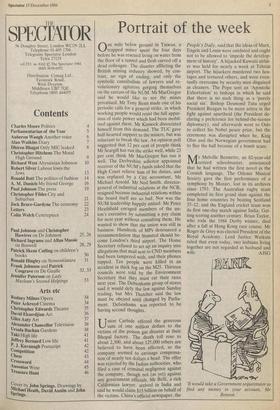Portrait of the week
One mile below ground in Taiwan, a trapped miner spent the four days before he was rescued living on water from the floor of a tunnel and flesh carved off a dead colleague. The disaster afflicting the British mining industry showed, by con- trast, no sign of ending, and only the symbolic cannibalism of lawyers and re- volutionary agitators gorging themselves on the carcass of the NUM. Mr MacGregor said he would like to see the mines privatised. Mr Tony Benn made one of his periodic calls for a general strike, in which working people would resist the full appar- atus of state power which had been mobil- ised against them. Mr Kinnock dissociated himself from this demand. The TUC gave half-hearted support to the miners, but was reluctant to break the law. An opinion poll suggested that 12 per cent of people think Mr Scargill has run the strike well, while 23 per cent think Mr MacGregor has run it well. The Derbyshire solicitor appointed receiver of the NUM's funds asked that the High Court relieve him of his duties, and was replaced by a City accountant, Mr Michael Arnold. Mr Ned Smith, director- general of industrial relations at the NCB, resigned because industrial relations within the board itself are so bad. Nor was the NUM leadership happily united: Mr Peter Heathfield enraged members of the un- ion's executive by submitting a pay claim for next year without consulting them. He wanted to show that the union was still in business. Hundreds of MPs denounced a recommendation that Stansted should be- come London's third airport. The Home Secretary refused to set up an inquiry into allegations that mail sent to CND members had been tampered with, and their phones tapped. Ten people were killed in an accident in thick fog on the M25. Thirteen councils were told by the Environment Secretary that they must cut their rates next year. The Debenhams group of stores said it would defy the law against Sunday trading, but Mrs Thatcher said the law must be obeyed until changed by Parlia- ment. Debenhams was reported to be having second thoughts.
Union Carbide offered the generous sum of one million dollars to the victims of the poison gas disaster at their Bhopal factory. The death toll rose to about 2,500, and about 125,000 others are believed to have been affected, so the company seemed to envisage compensa- tion of nearly ten dollars a head. The offer was rejected by the Indian authorities, who filed a case of criminal negligence against the company, though not (as yet) against any government officials. Mr Belli, a rich Californian lawyer, arrived in India and said he would claim $15 billion on behalf of the victims. China's official newspaper, the People's Daily, said that the ideas of Marx, Engels and Lenin were outdated and ought not to be allowed to 'impede the develop- ment of history'. A hijacked Kuwaiti airlin- er was held for nearly a week at Tehran airport. The hijackers murdered two hos- tages and tortured others, and were even- tually overcome by security men disguised as cleaners. The Pope sent an 'Apostolic Exhortation' to bishops in which he said that there is no such thing as a 'purely social sin'. Bishop Desmond Tutu urged President Reagan to be more active in the fight against apartheid (the President de- claring a preference for behind-the-scenes diplomacy), and afterwards went to Oslo to collect his Nobel peace prize, but the ceremony was disrupted when he, King Olav and the Norwegian government had to flee the hall because of a bomb scare.
Mr Melville Bennetto, an 82-year-old retired schoolmaster, announced that he had written the first novel in the Cornish language. The Odense Musical Society gave the first performance of a symphony by Mozart, lost in its archives since 1793. The Australian rugby team completed its first grand slam against the four home countries by beating Scotland 37-12, and the England cricket team won its first one-day match against India, Gat- ting scoring another century. Brian Taylor, who rode the 1984 Derby winner, died after a fall at Hong Kong race course. Mr Roger de Grey was elected President of the Royal Academy. Lord Justice Watkins ruled that even today, two lesbians living together are not regarded as husband and 'It would take a Government sequestrator to find any money in your account, Mr Benson.'


















































 Previous page
Previous page